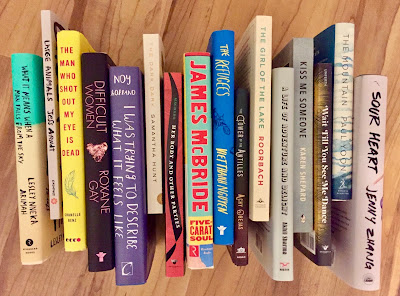 |
| Posts with the most: Karen Shepard, Louise Marburg, Geeta Kothari |
Last year, for the sixth straight year, we invited every author of a book entered for The Story Prize to contribute a guest post to this blog. Forty-seven of them chose to participate. Since 2010, the TSP blog has featured 499 guest posts from 482 different writers (some have contributed in more than one year).
According to Blogger's statistics, most 2017 author guest posts received 400 or more page views. The most popular post, "Karen Shepard: How to Make Intermittent and Erratic Progress as a Writer, in Twenty-Eight Easy Steps," has so far drawn more than 4,500 page views—the sixth most of any TSP blog post. "Antonya Nelson's Ten Writing Rules," the post with the most all-time views, currently has more than 14,000 of them.
The 2017 author contributions with the second and third most hits were "Louise Marburg Offers Ten Pieces of Writing Advice," with nearly 1,200 page views, and "Geeta Kothari Takes Her Time," with more than 1,000 page views to date.
The two posts with the largest Facebook reach were "Edie Meidav Urges You to Fail" and "Describe Your Reading Habits: An Interview with Deb Olin Unferth."
Many of these offer insights into the writing process or practical advice, serving as mini craft talks. Others get more personal. And several are simply very funny. Here then is this year's complete index, in alphabetical order by last name.
A-C
Frederick Luis Aldama and the Active Transformation of Culture
Henry Alley Finds Inspiration in His Archives
Jacob M. Appel on Being a Good Literary CitizenHenry Alley Finds Inspiration in His Archives
Josh Barkan Starts with Oddities
Emily Bieniek's New Year’s Resolution: To Devalue the Hero’s Journey
Jennifer Caloyeras Reluctantly Joins the Family Business
Olivia Clare on Accountability
Lee Conell on Spotting the Extraordinary Among the Ordinary
D-K
Rob Davidson Finds Inspiration in Images
What Cynthia Flood Has Learned
Tim Gautreaux's Ten Pieces of Writing Advice
Terry Griggs on the Little and the Large
Rob Davidson Finds Inspiration in Images
What Cynthia Flood Has Learned
Tim Gautreaux's Ten Pieces of Writing Advice
Terry Griggs on the Little and the Large
Daisy Johnson Plows Ahead
Jeffrey N. Johnson Builds on His Training
Siel Ju and the Suitable State of Mind
Michael Knight on a Literary Touchstone
Geeta Kothari Takes Her Time
L-O
Matthew Lansburgh Finds Time to Feed His Soul
Peter LaSalle: The Short Story vs. the Novel
Becky Mandelbaum's Four Simple Pieces of Advice
Louise Marburg Offers Ten Pieces of Writing Advice
The Drawings on Juan Martinez's Office Door
Edie Meidav Urges You to Fail
Timothy O'Leary Weaves Fact Into Fiction
Adam O'Riordan and the Impulse to Write Prose
Orlando Ortega-Medina Taps Into His Subconscious
P-S
KL Pereira on Lost and Missing Mothers
Matthew Pitt on Making a Memorable Impression
Zach Powers' Thoughts on (In)visible Prose
Bill Roorbach's Freaky Fridays
Michelle Ross Asks: Is a Story Ever Finished?
David Rutschman on Moving Between Distance and Intimacy
Scott Loring Sanders Pulls Flotsam from the Ether
Joseph Scapellato and the Story’s Intention
John Shea Gets Started
Karen Shepard: How to Make Intermittent and Erratic Progress as a Writer, in Twenty-Eight Easy Steps
Caitlin Hamilton Summie's Office with No Door
T-Y
Susan Tepper Keeps At It
Douglas Trevor on Toni Morrison and Subjective Histories
Describe Your Reading Habits: An Interview with Deb Olin Unferth
Samrat Upadhyay: Doctor or Engineer? Neither!
Katherine Vaz on Taking Notes and Making Box Art
Tim Weed and the Ecstasy of Influence
Josh Weil and the Scent of Sagebrush
Past indexes of guest posts:
2016
2015
2014
2013
2012
Jeffrey N. Johnson Builds on His Training
Siel Ju and the Suitable State of Mind
Michael Knight on a Literary Touchstone
Geeta Kothari Takes Her Time
L-O
Matthew Lansburgh Finds Time to Feed His Soul
Peter LaSalle: The Short Story vs. the Novel
Becky Mandelbaum's Four Simple Pieces of Advice
Louise Marburg Offers Ten Pieces of Writing Advice
The Drawings on Juan Martinez's Office Door
Edie Meidav Urges You to Fail
Timothy O'Leary Weaves Fact Into Fiction
Adam O'Riordan and the Impulse to Write Prose
Orlando Ortega-Medina Taps Into His Subconscious
P-S
KL Pereira on Lost and Missing Mothers
Matthew Pitt on Making a Memorable Impression
Zach Powers' Thoughts on (In)visible Prose
Bill Roorbach's Freaky Fridays
Michelle Ross Asks: Is a Story Ever Finished?
David Rutschman on Moving Between Distance and Intimacy
Scott Loring Sanders Pulls Flotsam from the Ether
Joseph Scapellato and the Story’s Intention
John Shea Gets Started
Karen Shepard: How to Make Intermittent and Erratic Progress as a Writer, in Twenty-Eight Easy Steps
Caitlin Hamilton Summie's Office with No Door
T-Y
Susan Tepper Keeps At It
Douglas Trevor on Toni Morrison and Subjective Histories
Describe Your Reading Habits: An Interview with Deb Olin Unferth
Samrat Upadhyay: Doctor or Engineer? Neither!
Katherine Vaz on Taking Notes and Making Box Art
Tim Weed and the Ecstasy of Influence
Josh Weil and the Scent of Sagebrush
Past indexes of guest posts:
2016
2015
2014
2013
2012






